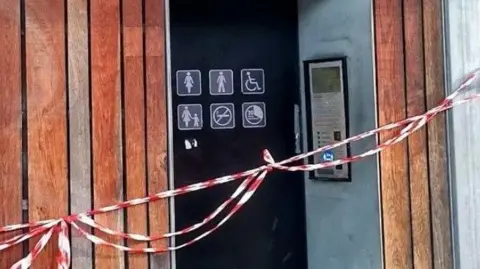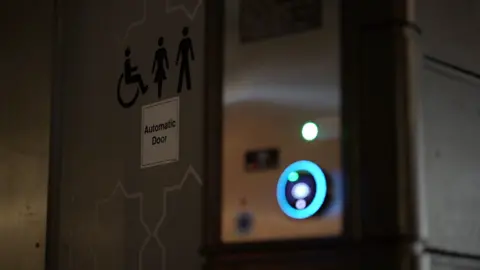'Worrying' fall in number of toilets, charity says
 Age UK London
Age UK LondonThere has been a "worrying decline" in access to public toilets in London over the past decade, according to a report by Age UK London.
Thirty local authorities out of 33 responded to a Freedom of Information request from the charity.
The data revealed there were fewer than 22 toilets per borough.
The mayor of London's office said the authority continued to work with Transport for London (TfL) and others "to ensure the availability and accessibility" of public lavatories.

Holly Fleet, a 31-year-old who has ulcerative colitis and a stoma bag, said this "toilet poverty" has impacted many people.
Ms Fleet said she does not leave her home unless she knows where the nearest toilet is going to be.
She called it a "disgrace" she had to plan her routes around supermarkets - some of the few places where people can use the facilities without being charged.
"When you live with a bowel condition or have a stoma bag, you can need the toilet at any point in time - when you're walking down the street or on the tube," she added.
London Loo Codes maintains an openly accessible database with many codes on it, while organisations such as the British Toilet Association, campaign for better provision.
The Royal Society for Public Health argues that public toilets should be considered "as essential as streetlights, roads and waste collection, and equally well enforced by legislation and regulations".

People with non-visible disabilities have told the BBC they face discrimination in restaurants and cafes when they present a card addressing their condition and the need for an accessible toilet.
John McGeachy, from Age UK London, said: "People with health conditions, older people, disabled Londoners, pregnant women, people with young families, we're all human, so we all benefit from more public toilets."
He said the availability of lavatories can determine whether people feel able to leave their homes.
"We've known provision has been declining in London and across the country for a long time, but this new report means we have a much clearer picture about the scale of decline."
'Biggest investment in toilets'
Mark Evers from TfL, said he recognised the issue is "absolutely essential" in customer care.
"It's the difference between going out and not going out, so it has a wider implication on their quality of life."
In October last year, TfL announced it would invest £15m on building more toilets across the network and improving existing facilities.
Mr Evers said it was the "biggest investment in toilets that London's transport network has ever seen".
The London mayor's office acknowledged the importance of public toilets as "a vital part of social infrastructure" and essential for people moving around the capital "particularly those who are older, disabled or with certain illnesses".
Age UK London is now calling for local and national government to take "urgent action" to improve provision.
Listen to the best of BBC Radio London on Sounds and follow BBC London on Facebook, X and Instagram. Send your story ideas to [email protected]
